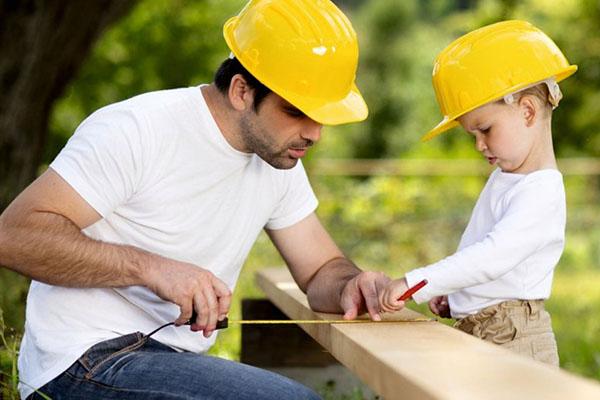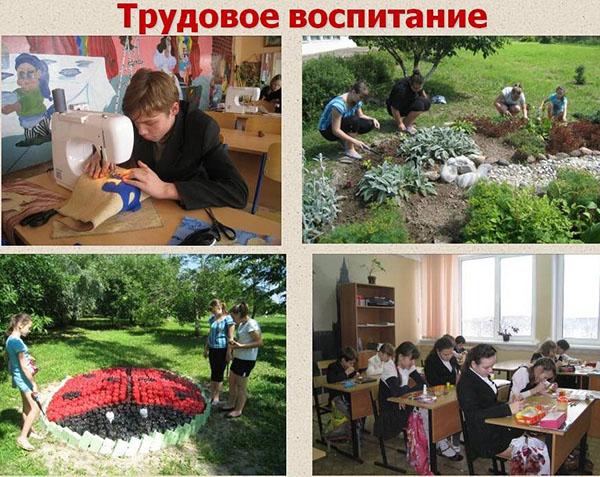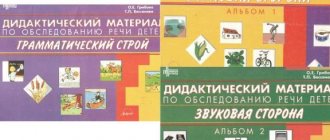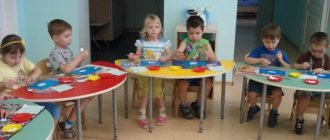Card index of conversations with children 5–7 years old “Let’s talk about hard work”
Nina Aleksandrovna Volkova
Card index of conversations with children 5–7 years old “Let’s talk about hard work”
Development of free communication between children and adults and children. "Let's talk about hard work."
Joint activities of the teacher with children 5-7 years old.
September
Conversation "Harvest".
Tasks. Continue to develop children's speech as a means of communication. Encourage children to try to express their point of view. Develop children's ability to observe ethical communication. Maintain children's interest in folk proverbs. To form a positive attitude of children towards work.
Talk.
“Children, let’s sit side by side and talk well, as from ancient times in Rus' they invited people to talk.” To a conversation when a person shares his thoughts. Children, why do you think they say this: “Good harvest and good harvesting?” (children's assumptions).
The teacher encourages the children.
- Don't be shy about your opinion! It is important for us to know what each of you thinks.
Kindly stops children who are trying to interrupt a friend's story.
- Please don’t interrupt, comrade. Respect your friend's opinion.
The teacher listens to the statements of all children. Summarizes what has been said.
- Children, in order to preserve a good, rich harvest, good, quick harvesting is needed. Good harvest and good cleaning.
Conversation “Like the master, so is the work.”
Tasks. Continue to develop children's speech as a means of communication. Encourage children to try to express their point of view. Develop children's ability to observe ethical communication. Maintain children's interest in folk proverbs. To instill in children a responsible attitude towards the assigned task.
Talk.
“Children, let’s sit side by side and talk well, as from ancient times in Rus' they invited people to talk.” To a conversation when a person shares his thoughts. Children, why do you think they say: “Like the master, so is the work?” (children's assumptions).
The teacher encourages the children.
- Don't be shy about your opinion! It is important for us to know what each of you thinks.
Kindly stops children who are trying to interrupt a friend's story.
- Please don’t interrupt, comrade. Respect your friend's opinion.
The teacher listens to the statements of all children. Summarizes what has been said.
- Children, the master is good, and the work is good. And a bad master does a bad job. Children, don’t forget to work, do your job well.
October
Conversation: “There is no good without work.”
Tasks. Continue to develop children's speech as a means of communication. Encourage children to try to express their point of view. Develop children's ability to observe ethical communication. Maintain children's interest in folk proverbs. To form a positive attitude of children towards work.
Talk.
“Children, let’s sit side by side and talk well, as from ancient times in Rus' they invited people to talk.” Why do you think the popular proverb says: “There is no good without labor?” (children's assumptions).
The teacher encourages the children.
- Don't be shy about your opinion! It is important for us to know what each of you thinks.
Kindly stops children who are trying to interrupt a friend's story.
- Please don’t interrupt, comrade. Respect your friend's opinion.
The teacher listens to the statements of all children. Summarizes what has been said.
- Children, there is no good without work. It’s not for nothing that people say that a good harvest and a good harvest, without labor there is no fruit; in order to be held in high esteem, you must love labor.
Conversation: “It’s a boring day until the evening.”
Tasks. Continue to develop children's speech as a means of communication. Encourage children to try to express their point of view. Develop children's ability to observe ethical communication. Maintain children's interest in folk proverbs. Cultivate hard work in children.
Talk.
“Children, let’s sit side by side and talk well, as from ancient times in Rus' they invited people to talk.” Children, why do you think people say: “The day until the evening is boring if there is nothing to do?” (children's assumptions).
The teacher encourages the children.
- Don't be shy about your opinion! It is important for us to know what each of you thinks.
Kindly stops children who are trying to interrupt a friend's story.
- Please don’t interrupt, comrade. Respect your friend's opinion.
The teacher listens to the statements of all children. Summarizes what has been said.
- Children, the day until the evening is boring if there is nothing to do. Those who love to work are not bored. Don't sit idly by, children, you won't get bored.
November
Conversation: “Skillful hands know no boredom.”
Tasks. Continue to develop children's speech as a means of communication. Encourage children to try to express their point of view. Develop children's ability to observe ethical communication. Maintain children's interest in folk proverbs. Cultivate hard work in children.
Talk.
“Children, let’s sit side by side and talk well, as from ancient times in Rus' they invited people to talk.” Why do you think the popular proverb says: “Skillful hands know no boredom?” (children's assumptions).
The teacher encourages the children.
- Don't be shy about your opinion! It is important for us to know what each of you thinks.
Kindly stops children who are trying to interrupt a friend's story.
- Please don’t interrupt, comrade. Respect your friend's opinion.
The teacher listens to the statements of all children. Summarizes what has been said.
- Children, skillful hands - hands that can do everything. Skillful hands do not know boredom. The day until the evening is boring if there is nothing to do. Don't sit idly by, children, you won't get bored.
Conversation: “Man’s labor feeds him.”
Tasks. Continue to develop children's speech as a means of communication. Encourage children to try to express their point of view. Develop children's ability to observe ethical communication. Maintain children's interest in folk proverbs. Cultivate hard work in children.
Talk.
“Children, let’s sit side by side and talk well, as from ancient times in Rus' they invited people to talk.” Why do you think the popular proverb says: “Work feeds a man, but laziness spoils him?” (children's assumptions).
The teacher encourages the children.
- Don't be shy about your opinion! It is important for us to know what each of you thinks.
Kindly stops children who are trying to interrupt a friend's story.
- Please don’t interrupt, comrade. Respect your friend's opinion.
The teacher listens to the statements of all children. Summarizes what has been said.
- Children, labor feeds a person, but laziness spoils him. Who does not work shall not eat. There is no good without work.
December
Conversation: “Business has time, but fun has time.”
Tasks. Continue to develop children's speech as a means of communication. Encourage children to try to express their point of view, agreement or disagreement with a friend’s answer. Develop children's ability to observe ethical communication. Encourage children to use proverbs in their speech. To instill in children a responsible attitude towards the assigned task.
Talk.
“Children, let’s sit side by side and talk well, as from ancient times in Rus' they invited people to talk.” Why do you think the popular proverb says: “There is time for work, but there is an hour for fun?” (children's assumptions).
The teacher encourages the children.
- And you, ... (child’s name,
what do you think! Agree or disagree with the opinions of your comrades.
Kindly stops children who are trying to interrupt a friend's story.
- Respect your comrade's judgment! Every person has the right to their opinion.
The teacher listens to the statements of all children, encouraging attempts to express their point of view, agreement or disagreement with a friend’s answer. Summarizes what has been said.
- Children, first do necessary, useful things, and then play.
Conversation "Who loves to work."
Tasks. Continue to develop children's speech as a means of communication. Encourage children to try to express their point of view, agreement or disagreement with a friend’s answer. Develop children's ability to observe ethical communication. Encourage children to use proverbs in their speech. Cultivate hard work in children.
Talk.
“Children, let’s sit next to each other and talk well.” Why do you think they say: “He who loves to work cannot sit idle?” (children's assumptions).
The teacher encourages the children.
- And you, ... (child’s name,
what do you think! Agree or disagree with the opinions of your comrades.
Kindly stops children who are trying to interrupt a friend's story.
- Respect your comrade's judgment! Every person has the right to their opinion.
The teacher listens to the statements of all children, encouraging attempts to express their point of view, agreement or disagreement with a friend’s answer. Summarizes what has been said.
- Children who love to work cannot sit idle. It’s not for nothing that people say that work for the hands is a holiday for the soul.
January
Conversation: “Without work, rest is not sweet.”
Tasks. Continue to develop children's speech as a means of communication. Encourage children to try to express their point of view, agreement or disagreement with a friend’s answer. Develop children's ability to observe ethical communication. Encourage children to use proverbs in their speech. To form a positive attitude of children towards work.
Talk.
“Children, let’s sit next to each other and talk well.” Why do you think the popular proverb says: “Without work, rest is not sweet?” ( children's assumptions).
The teacher encourages the children.
- And you, ... (child’s name)
, what do you think! Agree or disagree with the opinions of your comrades.
Kindly stops children who are trying to interrupt a friend's story.
- Respect your comrade's judgment! Every person has the right to their opinion.
The teacher listens to the statements of all children, encouraging attempts to express their point of view, agreement or disagreement with a friend’s answer. Summarizes what has been said.
- Children, without work, rest is not sweet. Work strengthens health and increases vitality. Work hard, children, don’t be lazy, and then enjoy your vacation.
February
Conversation: “We must love work.”
Tasks. Continue to develop children's speech as a means of communication. Encourage children to try to express their point of view, agreement or disagreement with a friend’s answer. Develop children's ability to observe ethical communication. Encourage children to use proverbs in their speech. Cultivate hard work in children.
Talk.
“Children, let’s sit next to each other and talk well.” Why do you think the popular proverb says: “To be respected, you must love your work?” (children's assumptions).
The teacher encourages the children.
- And you, ... (child’s name,
what do you think! Agree or disagree with the opinions of your comrades.
Kindly stops children who are trying to interrupt a friend's story.
- Respect your comrade's judgment! Every person has the right to their opinion.
The teacher listens to the statements of all children, encouraging attempts to express their point of view, agreement or disagreement with a friend’s answer. Summarizes what has been said.
- Children, honor is respect. To be respected, to be held in high esteem, children, you must love your work.
Conversation with the boys “The wealth of a young man is work.”
Tasks. Continue to develop children's speech as a means of communication. Encourage children to try to express their point of view, agreement or disagreement with a friend’s answer. Develop children's ability to observe ethical communication. Encourage children to use proverbs in their speech. To form a positive attitude of children towards work.
Talk.
“Children, let’s sit next to each other and talk well.” Why do you think people say: “The wealth of a young man is work?” ( children's assumptions).
The teacher encourages the children.
- And you, ... (child’s name)
, what do you think! Agree or disagree with the opinions of your comrades.
Kindly stops children who are trying to interrupt a friend's story.
- Respect your comrade's judgment! Every person has the right to their opinion.
The teacher listens to the statements of all children, encouraging attempts to express their point of view, agreement or disagreement with a friend’s answer. Summarizes what has been said.
- Children, if a fellow is hardworking and not lazy, everyone respects him and invites him to visit. A young man's wealth is labor. Hardworking fellow - well done!
March
Conversation with girls “Don’t learn by idleness, but learn by handicraft.”
Tasks. Continue to develop children's speech as a means of communication. To develop children’s ability to listen to another person and respect their opinion; calmly defend your opinion. Strengthen children's ability to observe communication ethics. Encourage children to use proverbs in their speech. Cultivate hard work in children.
Talk.
“Girls, let’s sit next to each other and talk well.” Why do you think they say: “Don’t learn by idleness, but learn by handicraft?” (children's assumptions).
The teacher encourages the children.
- And you, ... (child’s name)
, what do you think! It is important for us to know what each person thinks.
The teacher listens to the statements of all children, encourages children who carefully listen to the opinions of their comrades. Summarizes what has been said.
— A needlewoman, which means she knows how to do everything with her hands: sewing, knitting, embroidery. The girls, the needlewoman, not a slacker, were loved and praised by everyone.
Conversation: “Diligence and work lead to happiness.”
Tasks. Continue to develop children's speech as a means of communication. To develop children’s ability to listen to another person and respect their opinion; calmly defend your opinion. Strengthen children's ability to observe communication ethics. Encourage children to use proverbs in their speech. To form a positive attitude of children towards work.
Talk.
“Children, let’s sit next to each other and talk well.” Why do you think the popular proverb says: “Diligence and work lead to happiness?” (children's assumptions).
The teacher encourages the children.
- And you, ... (child’s name)
, what do you think! It is important for us to know what each person thinks.
The teacher listens to the statements of all children, encourages children who carefully listen to the opinions of their comrades. Summarizes what has been said.
- Children, effort and work lead to happiness. There is no good without work. Work for the hands is a holiday for the soul. From laziness - illness, from work - health.
April
Conversation "From laziness - illness."
Tasks. Continue to develop children's speech as a means of communication. To develop children’s ability to listen to another person and respect their opinion; calmly defend your opinion. Strengthen children's ability to observe communication ethics. Encourage children to use proverbs in their speech. Cultivate hard work in children.
Talk.
“Children, let’s sit next to each other and talk well.” Why do you think the popular proverb says: “Laziness brings illness, work brings health?” (children's assumptions).
The teacher encourages the children.
- And you, ... (child’s name,
what do you think! It is important for us to know what each person thinks.
The teacher listens to the statements of all children, encourages children who carefully listen to the opinions of their comrades. Summarizes what has been said.
- Children, from laziness - illness, from work - health. Laziness weakens us and causes illness. Work strengthens health and increases vitality. Work hard children, don't be lazy.
Conversation “A bird is recognized in flight.”
Tasks. Continue to develop children's speech as a means of communication. To develop children’s ability to listen to another person and respect their opinion; calmly defend your opinion. Strengthen children's ability to observe communication ethics. Encourage children to use proverbs in their speech. To form a positive attitude of children towards work.
Talk.
“Children, let’s sit next to each other and talk well.” Why do you think the popular proverb says: “A bird is recognized in its flight, but a man is recognized in his work?” (children's assumptions).
The teacher encourages the children.
- And you, ... (child’s name,
what do you think! It is important for us to know what each person thinks.
The teacher listens to the statements of all children, encourages children who carefully listen to the opinions of their comrades. Summarizes what has been said.
— Children, a person is valued by his hard work. A hardworking person is respected by everyone, but a lazy person is despised.
May
Conversation: “The harvest will not come on its own.”
Tasks. Continue to develop children's speech as a means of communication. To develop children’s ability to listen to another person and respect their opinion; calmly defend your opinion. Strengthen children's ability to observe communication ethics. Encourage children to use proverbs in their speech. Cultivate hard work in children.
Talk.
“Children, let’s sit next to each other and talk well.” Why do you think the popular proverb says: “The harvest will not come on its own: the crops need care?” (children's assumptions).
The teacher encourages the children.
- And you, ... (child’s name)
, what do you think! It is important for us to know what each person thinks.
The teacher listens to the statements of all children, encourages children who carefully listen to the opinions of their comrades. Summarizes what has been said.
- Children, the harvest will not come on its own: the crops need care. Don't put off until tomorrow what you can do today.
Conversation: “A small deed is better than a big idleness.”
Tasks. Continue to develop children's speech as a means of communication. To develop children’s ability to listen to another person and respect their opinion; calmly defend your opinion. Strengthen children's ability to observe communication ethics. Encourage children to use proverbs in their speech. To form a positive attitude of children towards work.
Talk.
“Children, let’s sit next to each other and talk well.” Why do you think the popular proverb says: “A little deed is better than a lot of idleness?” (children's assumptions).
The teacher encourages the children.
- And you, ... (child’s name)
, what do you think! It is important for us to know what each person thinks.
The teacher listens to the statements of all children, encourages children who carefully listen to the opinions of their comrades. Summarizes what has been said.
- Children, from laziness - illness, from work - health. Laziness weakens us and causes illness. Work strengthens health and increases vitality. Work hard, children, don't be idle.
June
Conversation “The sun paints the earth.”
Tasks. Continue to develop children's speech as a means of communication. To develop children’s ability to listen to another person and respect their opinion; calmly defend your opinion. Strengthen children's ability to observe communication ethics. Encourage children to use proverbs in their speech. To form a positive attitude of children towards work.
Talk.
“Children, let’s sit next to each other and talk well.” Why do you think the popular proverb says: “The sun paints the earth, but man’s labor?” (children's assumptions).
The teacher encourages the children.
- And you, ... (child’s name)
, what do you think! It is important for us to know what each person thinks.
The teacher listens to the statements of all children, encourages children who carefully listen to the opinions of their comrades. Summarizes what has been said.
— Children, a person is valued by his hard work. A hardworking person is respected by everyone, but a lazy person is despised.
July
Conversation “The bee is small, and it works”
.
Tasks. Continue to develop children's speech as a means of communication. To develop children’s ability to listen to another person and respect their opinion; calmly defend your opinion. Strengthen children's ability to observe communication ethics. Encourage children to use proverbs in their speech. To form a positive attitude of children towards work.
Talk.
“Children, let’s sit next to each other and talk well.” Why do you think the popular proverb says: “The bee is small, but it works?” (children's assumptions).
The teacher encourages the children.
- And you, ... (child’s name
, what do you think! It is important for us to know what each person thinks.
The teacher listens to the statements of all children, encourages children who carefully listen to the opinions of their comrades. Summarizes what has been said.
- Children, work hard, don’t be lazy. People honor and respect those who love work.
Conversation “Who reaps the harvest without loss.”
Tasks. Continue to develop children's speech as a means of communication. To develop children’s ability to listen to another person and respect their opinion; calmly defend your opinion. Strengthen children's ability to observe communication ethics. Encourage children to use proverbs in their speech. Cultivate hard work in children.
Talk.
“Children, let’s sit side by side and talk well, as from ancient times in Rus' they invited people to talk.” Why do you think the popular proverb says: “He who reaps the harvest without loss wins?” (children's assumptions).
The teacher encourages the children.
- And you, ... (child’s name)
, what do you think! It is important for us to know what each person thinks.
The teacher listens to the statements of all children, encourages children who carefully listen to the opinions of their comrades. Summarizes what has been said.
“Children, whoever harvests without loss wins and stores food for the winter.” Good harvest and good cleaning.
August
Conversation: “I missed the day, I lost the harvest.”
Tasks. Continue to develop children's speech as a means of communication. To develop children’s ability to listen to another person and respect their opinion; calmly defend your opinion. Strengthen children's ability to observe communication ethics. Encourage children to use proverbs in their speech. Cultivate hard work in children.
Talk.
“Children, let’s sit next to each other and talk well.” Why do you think the popular proverb says: “If you miss a day, you lose the harvest?” (children's assumptions).
The teacher encourages the children.
- And you, ... (child’s name,
what do you think! It is important for us to know what each person thinks.
The teacher listens to the statements of all children, encourages children who carefully listen to the opinions of their comrades. Summarizes what has been said.
“Children, if you miss a day, you lose the harvest; whoever harvests without loss wins.” Good harvest and good cleaning.
Conversation: “Without labor there is no fruit.”
Tasks. Continue to develop children's speech as a means of communication. To develop children’s ability to listen to another person and respect their opinion; calmly defend your opinion. Strengthen children's ability to observe communication ethics. Encourage children to use proverbs in their speech. To form a positive attitude of children towards work.
Talk.
“Children, let’s sit next to each other and talk well.” Why do you think people say: “Without labor there is no fruit?” (children's assumptions).
The teacher encourages the children.
“It’s important for us to know what each of you thinks.”
Kindly stops children who are trying to interrupt a friend's story.
- Respect your friend's opinion.
The teacher listens to the statements of all children, encouraging attempts to express their point of view, agreement or disagreement with a friend’s answer. Summarizes what has been said.
“Children, the harvest will not come on its own: the plants need care, if you missed a day, you will lose the harvest; whoever harvests the harvest without losses wins.” Without labor there is no fruit.
Labor education in kindergarten
At the same time that a child is accustomed to work at home, he acquires new skills in educational institutions. How well the baby will learn them depends on the teachers.
To develop readiness for work, the following forms of training are used:
- Conversation about different types of work and professions.
- Getting to know professions in a playful way (playing at the hospital, going to school).
- Light household chores (making the bed, putting away dishes).
Labor education in kindergarten has its own subtleties. The teacher must take into account the age characteristics of the children. Increasing the volume of work, complicating its content, and increasing the pace should be done gradually.
Labor professional and economic education events
* Analysis of the regional labor market;
* Questioning employers to identify their requirements for graduates; * Conversations on the topics: “Are you satisfied with the choice of your profession”; “Educational activities and continuity of vocational education”; * Improvement of the territory of the educational institution; * Familiarity with production at the workplace; * Temporary and permanent household duties; * Inclusion of a student in a group or team of people working together; * Meetings with graduates of different years; * Interaction with enterprises and organizations of the region, regional and local administrations; * Meetings with social partners; * Meetings with representatives of labor dynasties, graduates, labor veterans, business representatives; * Meetings with employers; * Fulfilling orders under contracts in college workshops; * Meetings with employees of the Employment Center; * Meetings with practical workers; Meetings with managers and specialists of enterprises; * Exhibition of creative works of students and teachers; * Additional financial incentives for students who have high academic performance, research work, and activists; * Disputes; * Business games “What do I know about my profession?”; * Decades of knowledge; * Duty in educational institutions; * Familiarity with the requirements of employers; * Acquaintance with new technologies; * Study of the labor market; * Games: “Lucky Chance”, “Tournament of Experts”, “Own Game”; * Production of visual and poster materials in college classrooms and workshops; * Round tables “How to find a job”; * Competitions by profession “Best in Profession”; * Wall printing competitions; * Competition for the best group website and personal page; * Class hours: “First steps when getting a job”, “Labor rights of young people”, “Personal and social in choosing a profession...”, “The importance of professional choice in later life”; “What are professional ethics and the personal and professional growth of a student” ;"What is the secret of success"; * Events: “Specialist of the 21st Century”, “Initiation as a Student”, “Evening with Alumni”; * Organization of work in hobby groups; * Training in technologies and work practices; * Determination of specific job responsibilities; * Providing work with the necessary material resources; * Providing temporary employment for students; * Organization and holding of mass cleanup days; * Design and equipment of workshops and laboratories; * Organization of additional professional education on a paid basis for college students; * Organization of industrial training in the summer at enterprises; * Olympics, quizzes; * Organization of practical training for students at enterprises and workshops * of an educational institution; * Greening streets in populated areas; * Maintaining the sanitary condition of classrooms; * Internship at enterprises; * Visiting territorial fairs of educational and workplaces; * Visiting professional skills competitions, thematic exhibitions on professions in museums, exhibition halls; * Carrying out events glorifying family dynasties and family traditions; * Preparation of didactic material, visual aids; * Conducting individual lessons with students, involving them in creative activities; * Representing your profession at a competition; * Repair of educational visual aids, books in the library, furniture and equipment; * Parent meetings “Labor education”; * Work of technical creativity circles; * Work of the Center for the Promotion of Student Employment and Graduate Employment; * Systematic participation in socially useful work; * Essays; * Collecting information about new products in the profession, setting up stands in workshops and offices; * Wall newspapers and stand design for professional holidays; * Subbotniks, general cleaning, furniture repairs; * Student construction teams; * Student scientific and practical conferences; * Creating an external environment conducive to work; * Creation of an information system that provides graduates and students with data on the state of the labor market; * Thematic classroom hours; * Creative exhibitions, competitions and competitions, assessment of their quality; * Participation in open events to prepare for military service; * Participation in the All-Russian competition of scientific and technical creativity of youth; * Participation of students in the summer work semester; * Strengthening the material and technical base of the college by students; * Participation of social partners in the professional development of students; * Participation of employers in the final certification; * Participation of employers in professional skills competitions; * Formation of student teams; * Excursions to enterprises; * Excursions to the facilities of agricultural enterprises, to enterprises according to the profile of professions and specialties; * Excursions to enterprises; * Excursions to enterprises of the city and region; * Legal education of students. Source
Role of the family

Raising a child and teaching him to work begins in the family. From an early age, when the baby is just beginning to socialize, he observes his parents, older brothers and sisters, and other relatives who are constantly nearby, and adopts their attitude to work.
Domestic chores do not always bring joy to the child; you have to overcome yourself. This builds character, develops willpower, and if parents do not skimp on praise, it also increases self-esteem.
Labor upbringing in the family is the most important stage in the formation of a personality, because this is where the child spends most of his daily life and is happy to first carry out light household chores for his mother, father or grandmother (cleaning up toys), and then get accustomed to more serious work (washing dishes, taking out the trash). ).
If parents instill in their child a love of work from childhood, allowing him to take part in matters that interest him (even if he only gets in the way at first), then as he grows up, they will receive a full-fledged assistant in the household. And, on the contrary, by forbidding the child to help his mother or father, one should not be surprised that he then categorically refuses to work for the benefit of the family, and then society.
There is no need to push your child away if he wants to help bake a cake or repair a car. You can let him do simple work that he can do and explain how to do everything correctly. This is how the child gets accustomed to work and at the same time his self-confidence increases, because he is doing “adult work.”
Teaching schoolchildren to work

The love of work begins to be instilled most actively at school. Younger students collect herbariums, help in the garden and in the living corner (if there is one), and water the flowers in the classroom.
Thanks to labor education, the child masters skills that he will then need throughout his life (household, self-service).
Work develops independence from adults, increases self-esteem and the desire to develop further.
By doing even the simplest work independently, the baby learns to do everything neatly and beautifully, which develops a sense of beauty. He begins to appreciate other people's work, feeling that to achieve a result it is necessary to make volitional efforts.
Labor education of schoolchildren in high school is associated with career guidance of students.
For this purpose, lectures are held in which high school students are presented with representatives of different professions:
- talk about their work;
- explain where you need to go to study in order to get a profession;
- answer children's questions.
They organize excursions to enterprises where people’s work is clearly shown. Basically, children are taken to a city-forming enterprise that needs fresh personnel. As a result, schoolchildren learn first-hand about various types of work activities, which allows them to make an informed choice of profession.
Labor is the basis for the harmonious development of personality. It is important from early childhood to instill in a child respect for him, to work productively, increasing his professionalism. This is precisely the main goal of labor education.
Games on labor education in preschool educational institutions for children of the middle and senior groups (4-6 years old)
As already mentioned, play activity in preschool age is the leading one. The information obtained during the conversation is reinforced through games. Games can be didactic (used in educational activities), or they can be role-playing. Each game aimed at the labor education of a preschooler must be appropriate for his age. The purpose of such games is to develop a positive attitude towards work.
In the middle group, children begin to become familiar with the concepts of “profession” and “work.” They learn how and why adults work. The list of professions for reference includes those that the child encounters in everyday life. This is a cook, a janitor, a nanny, a teacher, a musician, an artist, a painter, a driver, a salesman, a hairdresser. They must understand the essence of work (manager, stylist and others are not included in this list) . In the older group, children can play under the guidance of a teacher or independently. For independent role-playing games in groups, play areas are organized: hairdresser, shop, hospital, workshop, etc.
Labor and economic training and education of students
Objectives and content of labor education. The labor education of a child begins with the formation in the family and school of elementary ideas about labor responsibilities. Labor has been and remains a necessary and important means of developing the psyche and moral ideas of the individual. Labor activity should become a natural physical and intellectual need for schoolchildren. Labor education is closely related to the polytechnic training of students. Polytechnic education provides knowledge of the basics of modern technology, technology and production organization; equips students with general labor knowledge and skills; develops a creative attitude to work; contributes to the right choice of profession. Thus, polytechnic education is the basis of labor education.
In the context of a comprehensive school, the following tasks of labor education of students are solved:
• developing in students a positive attitude towards work as the highest value in life, high social motives for work; • development of cognitive interest in knowledge, the need for creative work, the desire to apply knowledge in practice; • fostering high moral qualities, hard work, duty and responsibility, determination and entrepreneurship, efficiency and honesty; • equipping students with a variety of work skills and abilities, forming the foundations of a culture of mental and physical work.
The content of labor education is determined by the named tasks, as well as a number of economic factors, production conditions of the district, region, capabilities and traditions of the school, etc.
The content of the labor education of schoolchildren consists of the following types of labor.
The educational work of a schoolchild includes mental and physical work. Mental work is the most intense, requiring great willpower, patience, and perseverance. The habit of daily mental work is of great importance for all types of work activity. School programs provide for physical labor during labor training lessons in educational workshops and at the school site. In the process of physical labor, conditions are created for children to demonstrate moral qualities, collectivism, mutual assistance, respect for people and the results of their activities.
Socially useful work is organized in the interests of members of the entire team and each child individually. It includes self-care work at school and at home (cleaning the classroom, school grounds, household chores at home, caring for plantings, etc.), summer work in the fields during school holidays, work in school construction teams, school forestries, Timurov work .
Productive work presupposes the participation of schoolchildren in the creation of material values and entry into production relations. Participation in productive work develops students’ professional interests, inclinations, and labor needs; they learn the meaning of environmental concepts and categories.
Pedagogical conditions for organizing labor education. The success of labor education depends on its proper organization and compliance with such pedagogical conditions as:
• subordination of children's labor to educational tasks, which is achieved in the process of interpenetration of the goals of educational, socially useful and productive labor. In socially useful and productive work, students should find practical application of the knowledge and skills acquired in the educational process. The tasks of labor training and raising children are solved comprehensively in household work, circle work, and in classes in additional education institutions;
• combination of the social significance of work with the personal interests of the student. Children must be convinced of the appropriateness and usefulness of the upcoming activity for society, their family and for themselves. The meaning of work is explained to students taking into account their age, individual interests and needs. The effectiveness of compliance with this pedagogical condition is clearly shown by the pedagogical experience of V. A. Sukhomlinsky. His students decided to use the empty hillside. They plowed it, planted it with grapes, looked after it, saved it from frost, and when they grew the grapes, they took the first bunches straight from the garden to war and labor veterans, pensioners, and village residents;
• accessibility and feasibility of work. Overwork is impractical simply because it, as a rule, does not lead to achieving the desired result. Such work undermines the spiritual and physical strength of children and their self-confidence. It does not follow from this, however, that the work of children should not require any effort from them. Compliance with this condition eliminates physical overload and requires the selection of work tasks in accordance with the strengths and abilities of students;
• reasonable demands in students' work activities. Sometimes students take on a task with enthusiasm, but quickly lose interest. The teacher’s task is to, in the process of fulfilling their commitment, maintain in children the desire to complete the work, to teach them to work systematically and evenly. In some cases, the class team has the right to demand that schoolchildren fulfill their obligations;

Labor education forms the foundation of creative activity and effectiveness in educational activities, in the civic and moral development of the individual.
The main goal of economic education is the formation of a personality capable of navigating a market environment and able to carry out its activities in an economically feasible manner.
This goal is achieved by solving a set of problems: developing students’ needs for economic knowledge and economic activity; assimilation | basic economic concepts, categories, laws and processes; development of entrepreneurship, responsibility, independence; acquiring the skills necessary for entrepreneurial activity; formation of I psychological readiness for possible difficulties.
On the need for economic education and educational; The information was indicated by K.D. Ushinsky, ST. Shatsky. Many authors (A.G. Kalashnikov, M.N. Skatkin and others) connected economic education with polytechnic education.
The content of economic education involves the use of various subjects for students to master economic knowledge; studying special courses on the principles of economics both during school and extracurricular hours (“business club”, “managers club”, “marketing club”, etc.); professional education. Forms and methods of economic education are aimed at developing the needs and skills to independently acquire economic knowledge and use it in non-standard situations. Vocational guidance is informational and organizational-practical activities of the family, educational institutions, state, society and commercial organizations that provide assistance to the population in choosing, selecting or changing a profession, taking into account the individual-167
nal interests of each individual and the needs of the labor market. This is a well-founded system of socio-economic, psychological-pedagogical, medical-biological, production and technical measures aimed at providing assistance in professional self-determination.
Special research on the theory and methodology of career guidance for schoolchildren was carried out by teachers and psychologists (E.A. Klimov, P.P. Kostenkov, A.D. Sazonov, V.F. Sakharov, S.N. Chistyakova, L.P. Krivshen- ko, etc.).
The vocational guidance system includes:
professional education - providing students with certain knowledge about the socio-economic, psychophysiological characteristics of certain professions;
professional diagnostics - the study of the characteristics of a person’s higher nervous activity, his state of health, interests and motives, value orientations, attitudes in choosing a profession;
professional consultation - establishing correspondence between the requirements for the profession and the individual psychological characteristics of a particular person;
• • professional selection - carried out by institutions that hire a person;
• professional adaptation - the process of a person’s entry into professional activity, adaptation to the production system, and the characteristics of the specialty.
Source
Socially useful work. Production labor
The tasks of labor education and training are solved in labor lessons. In the elementary grades, children engage in paper cutting, clay and plasticine sculpting, plant care, wood, plastic and wire work, and school yard work. Work on the school experimental field and in workshops in high school, as well as in industrial and agricultural workshops in high school, develops students' general work skills and abilities, broadens their polytechnic prospects and contributes to the formation of their professional intentions and life plans.
Socially useful work. Such work has long been a good stimulus for the educational process, a real school of public service. Socially useful work, which is not only a source of material values, from the first days of school involves students in the sphere of public relations and introduces them to the affairs of the country.
The range of socially useful activities carried out by students is quite wide: from patronage of kindergartens and families of workers and war veterans to landscaping of villages and cities, creation of forest belts and parks, conservation of nature and historical monuments.
Participation in activities for the benefit of the district, city, and charity events is the best school of education.
School self-government occupies an important place in the labor education of students. He takes care of the cleanliness and beauty of classrooms, laboratories, workshops, school grounds, sports grounds and school grounds, as well as the repair of books and illustrative materials of the library. The simplest form of self-service is school service.
In the process of self-service, students develop collectivism, frugality, accuracy, and lay a strong foundation for sanitary and hygienic skills. They are the masters of the classroom and school, the organizers of common work, everyday life and leisure.
Production work. This is the sphere of pedagogical reality where the principle of combining education and productive labor is most fully and consistently implemented.
At different ages, the forms of organization of productive labor and the methods of its implementation are different. For younger schoolchildren, productive work is associated with play. In this case, tools and equipment specially made for children are used. Teenagers and high school students work alongside adults, use the same tools, the same equipment, work under the same conditions, receive their own work orders, plan the sequence of work, supervise its implementation and evaluate the results. Work will never be desirable and attractive for a child if it does not bring the experience of success and inner satisfaction.
Therefore, it makes pedagogical sense to organize work tasks in such a way that their implementation leads to tangible results, contributes to the development of dexterity, and enriches emotions. It also turned out that student labor training itself involves a significant conceptual base from many academic subjects. They cannot be taught in full in a comprehensive school. However, it is clear that schools cannot distance themselves from vocational education. The way out of this difficult situation is to introduce the subject “Technology”, which is taught in grades 1-9 and in grades 10-11 in specialized subjects.
“Technology” allows students to consistently form a conceptual understanding of work activity and its implementation in the form of exercises, laboratory-practical, school practical, creative and design work. Teachers of secondary schools, solving problems of labor education, should turn to the “Technology” course. Of course, educational excursions to enterprises of various profiles are useful for the professional orientation of students. It is possible that some of these profiles are underrepresented in the technology course.
However, it would be a mistake to think that effective work education does not need a solid conceptual basis. In secondary general education it is represented only by the subject “Technology”. Of course, it should be given due attention as much as other subjects, and when teaching any discipline it is useful to consider its interdisciplinary connections with technology.






